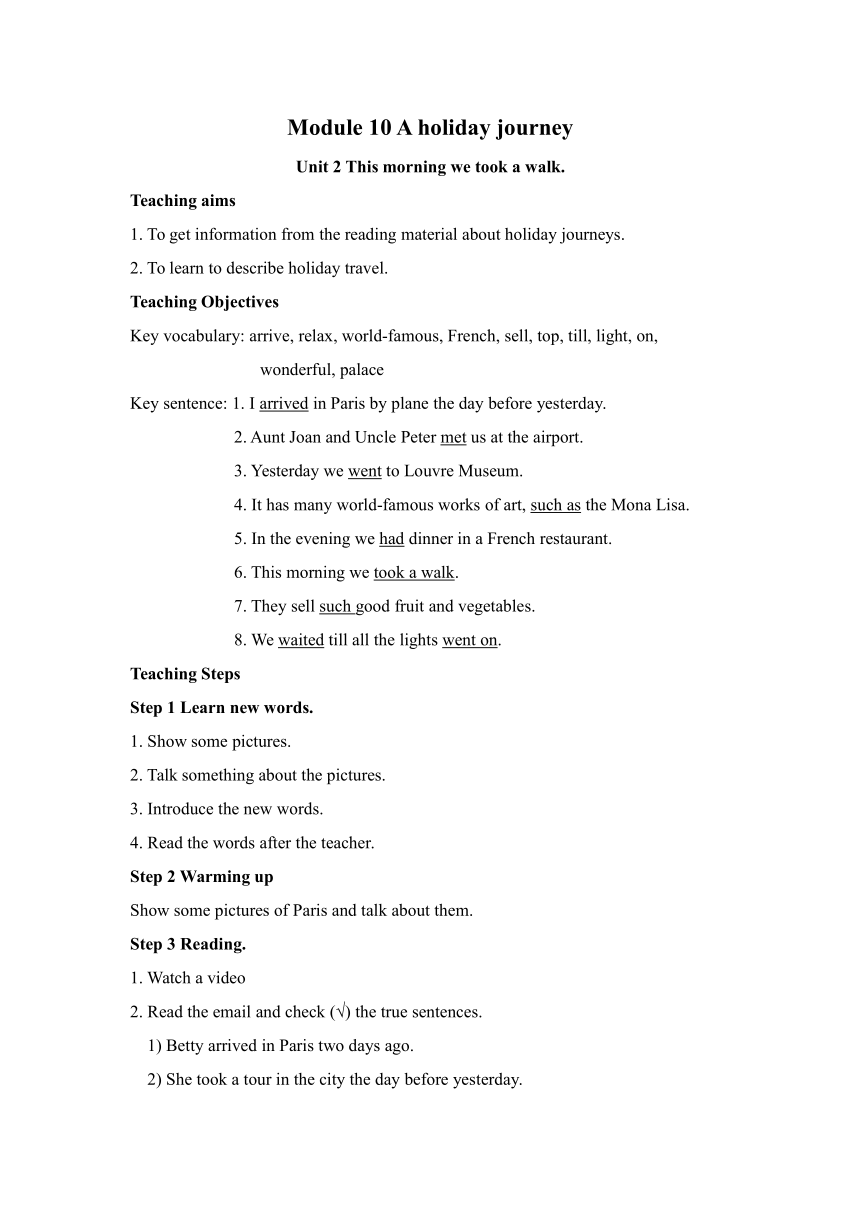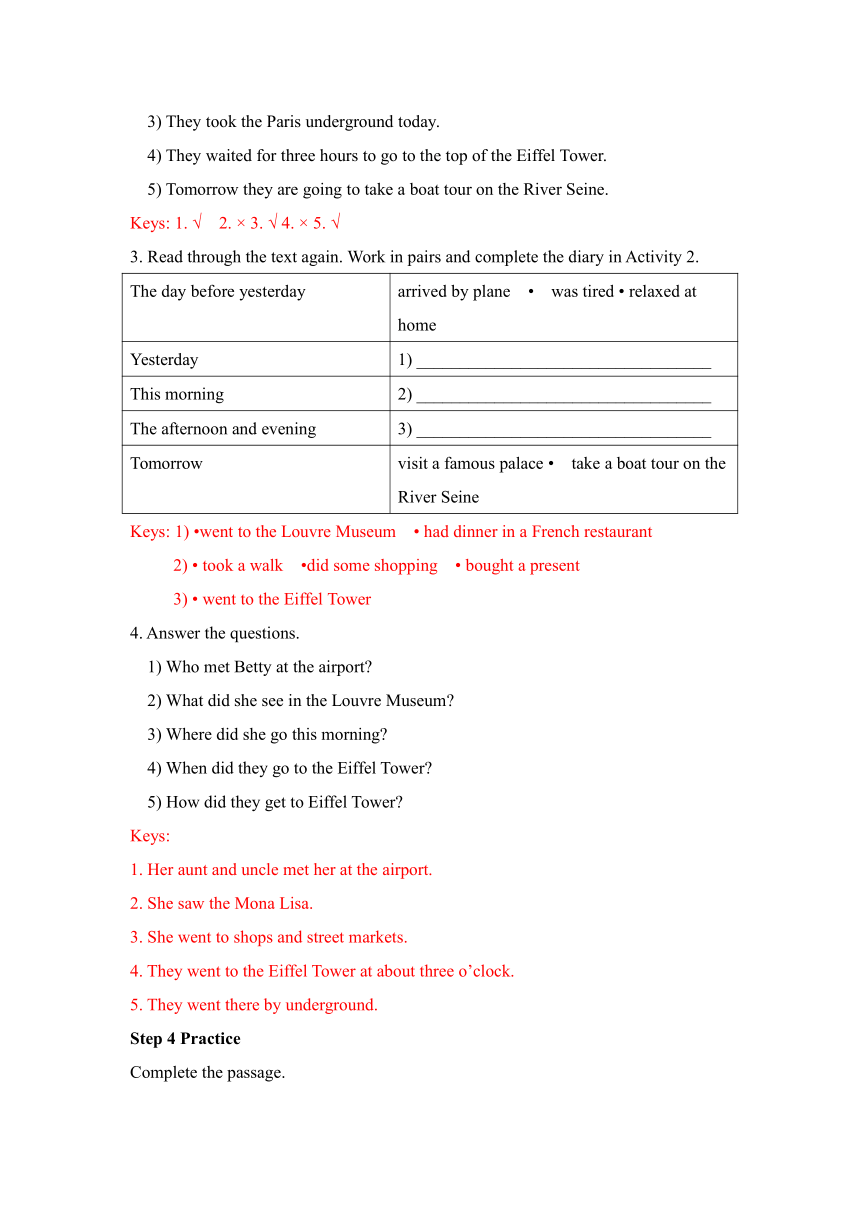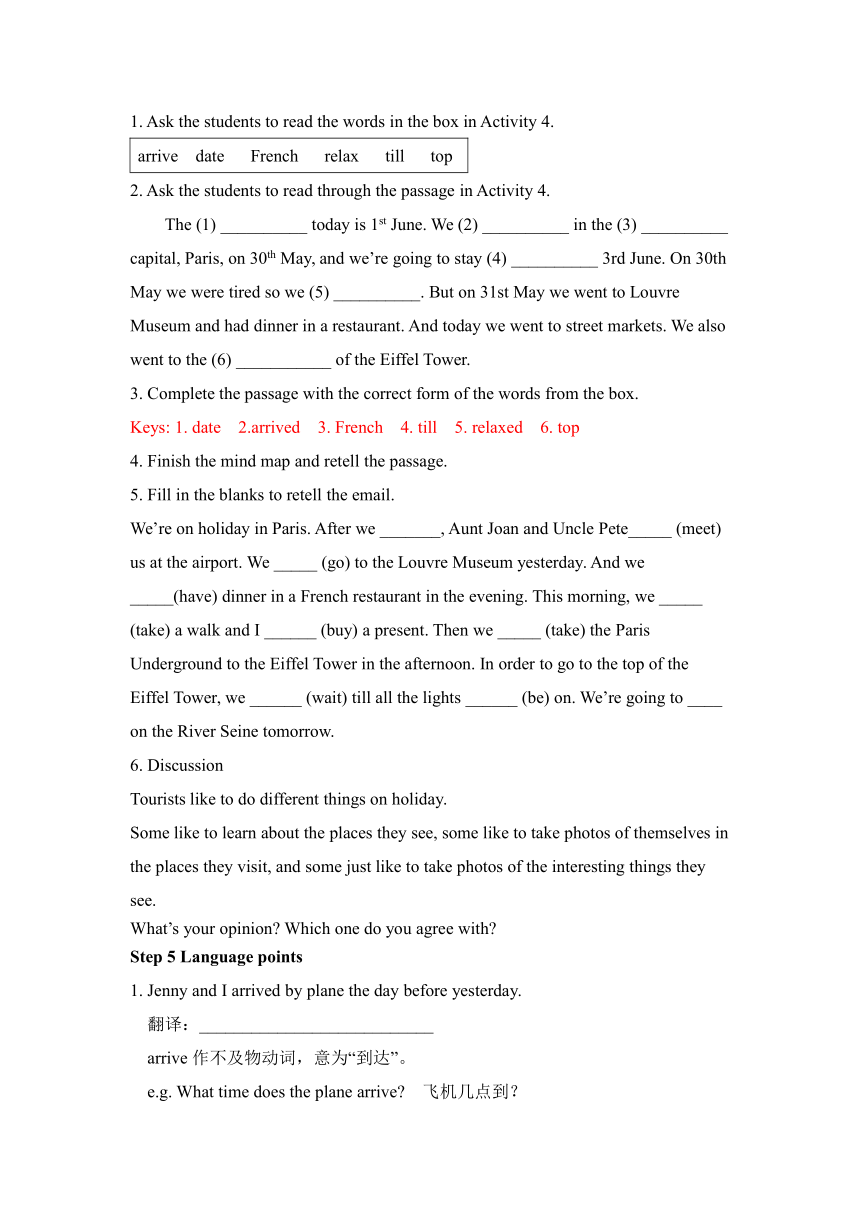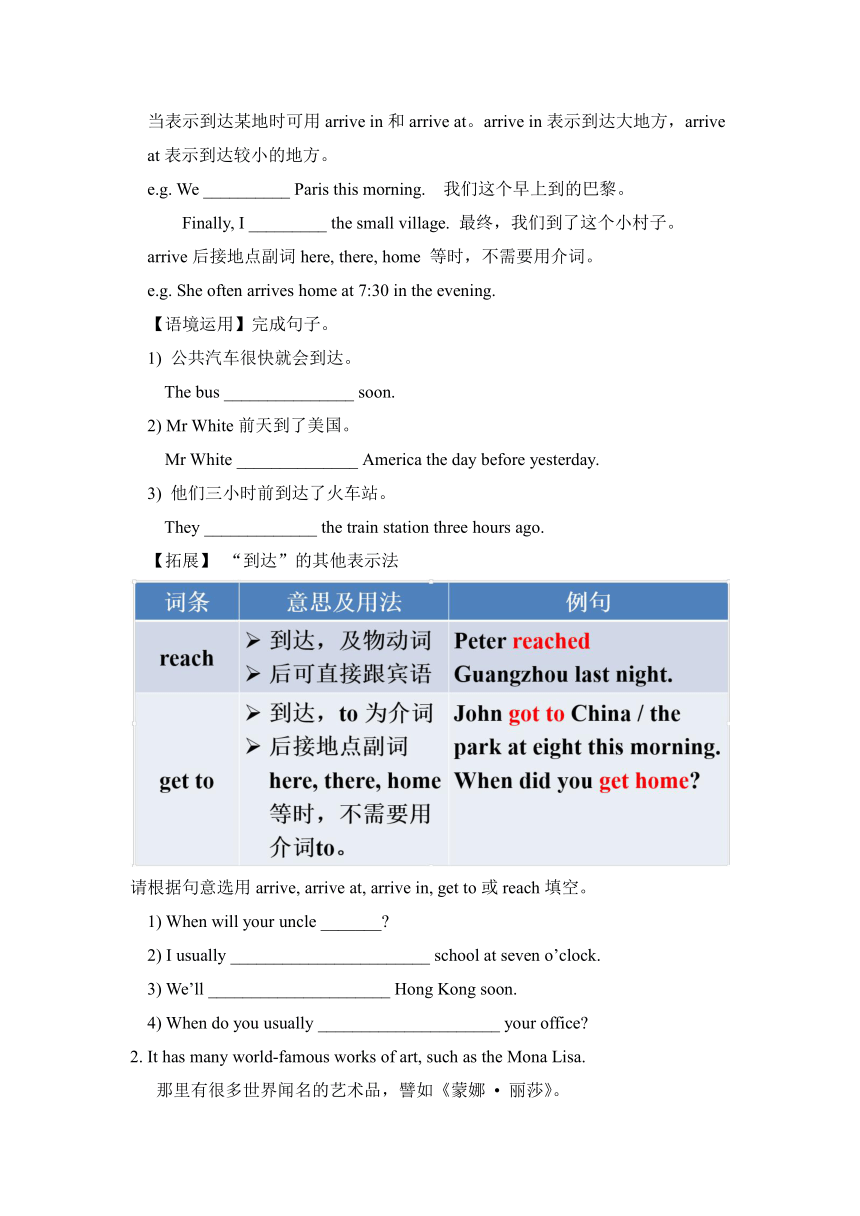Module 10 Unit 2 This morning we took a walk教案 2023-2024学年外研版英语七年级下册
文档属性
| 名称 | Module 10 Unit 2 This morning we took a walk教案 2023-2024学年外研版英语七年级下册 |

|
|
| 格式 | docx | ||
| 文件大小 | 190.6KB | ||
| 资源类型 | 教案 | ||
| 版本资源 | 外研版 | ||
| 科目 | 英语 | ||
| 更新时间 | 2024-02-23 00:00:00 | ||
图片预览




文档简介
Module 10 A holiday journey
Unit 2 This morning we took a walk.
Teaching aims
1. To get information from the reading material about holiday journeys.
2. To learn to describe holiday travel.
Teaching Objectives
Key vocabulary: arrive, relax, world-famous, French, sell, top, till, light, on, wonderful, palace
Key sentence: 1. I arrived in Paris by plane the day before yesterday.
2. Aunt Joan and Uncle Peter met us at the airport.
3. Yesterday we went to Louvre Museum.
4. It has many world-famous works of art, such as the Mona Lisa.
5. In the evening we had dinner in a French restaurant.
6. This morning we took a walk.
7. They sell such good fruit and vegetables.
8. We waited till all the lights went on.
Teaching Steps
Step 1 Learn new words.
1. Show some pictures.
2. Talk something about the pictures.
3. Introduce the new words.
4. Read the words after the teacher.
Step 2 Warming up
Show some pictures of Paris and talk about them.
Step 3 Reading.
1. Watch a video
2. Read the email and check (√) the true sentences.
1) Betty arrived in Paris two days ago.
2) She took a tour in the city the day before yesterday.
3) They took the Paris underground today.
4) They waited for three hours to go to the top of the Eiffel Tower.
5) Tomorrow they are going to take a boat tour on the River Seine.
Keys: 1. √ 2. × 3. √ 4. × 5. √
3. Read through the text again. Work in pairs and complete the diary in Activity 2.
The day before yesterday arrived by plane was tired relaxed at home
Yesterday 1) __________________________________
This morning 2) __________________________________
The afternoon and evening 3) __________________________________
Tomorrow visit a famous palace take a boat tour on the River Seine
Keys: 1) went to the Louvre Museum had dinner in a French restaurant
2) took a walk did some shopping bought a present
3) went to the Eiffel Tower
4. Answer the questions.
1) Who met Betty at the airport
2) What did she see in the Louvre Museum
3) Where did she go this morning
4) When did they go to the Eiffel Tower
5) How did they get to Eiffel Tower
Keys:
1. Her aunt and uncle met her at the airport.
2. She saw the Mona Lisa.
3. She went to shops and street markets.
4. They went to the Eiffel Tower at about three o’clock.
5. They went there by underground.
Step 4 Practice
Complete the passage.
1. Ask the students to read the words in the box in Activity 4.
arrive date French relax till top
2. Ask the students to read through the passage in Activity 4.
The (1) __________ today is 1st June. We (2) __________ in the (3) __________ capital, Paris, on 30th May, and we’re going to stay (4) __________ 3rd June. On 30th May we were tired so we (5) __________. But on 31st May we went to Louvre Museum and had dinner in a restaurant. And today we went to street markets. We also went to the (6) ___________ of the Eiffel Tower.
3. Complete the passage with the correct form of the words from the box.
Keys: 1. date 2.arrived 3. French 4. till 5. relaxed 6. top
4. Finish the mind map and retell the passage.
5. Fill in the blanks to retell the email.
We’re on holiday in Paris. After we _______, Aunt Joan and Uncle Pete_____ (meet) us at the airport. We _____ (go) to the Louvre Museum yesterday. And we _____(have) dinner in a French restaurant in the evening. This morning, we _____ (take) a walk and I ______ (buy) a present. Then we _____ (take) the Paris Underground to the Eiffel Tower in the afternoon. In order to go to the top of the Eiffel Tower, we ______ (wait) till all the lights ______ (be) on. We’re going to ____ on the River Seine tomorrow.
6. Discussion
Tourists like to do different things on holiday.
Some like to learn about the places they see, some like to take photos of themselves in the places they visit, and some just like to take photos of the interesting things they see.
What’s your opinion Which one do you agree with
Step 5 Language points
1. Jenny and I arrived by plane the day before yesterday.
翻译:___________________________
arrive作不及物动词,意为“到达”。
e.g. What time does the plane arrive 飞机几点到?
当表示到达某地时可用arrive in和arrive at。arrive in表示到达大地方,arrive at 表示到达较小的地方。
e.g. We __________ Paris this morning. 我们这个早上到的巴黎。
Finally, I _________ the small village. 最终,我们到了这个小村子。
arrive后接地点副词here, there, home 等时,不需要用介词。
e.g. She often arrives home at 7:30 in the evening.
【语境运用】完成句子。
1) 公共汽车很快就会到达。
The bus _______________ soon.
2) Mr White前天到了美国。
Mr White ______________ America the day before yesterday.
3) 他们三小时前到达了火车站。
They _____________ the train station three hours ago.
【拓展】 “到达”的其他表示法请根据句意选用arrive, arrive at, arrive in, get to或reach填空。
1) When will your uncle _______
2) I usually _______________________ school at seven o’clock.
3) We’ll _____________________ Hong Kong soon.
4) When do you usually _____________________ your office
2. It has many world-famous works of art, such as the Mona Lisa.
那里有很多世界闻名的艺术品,譬如《蒙娜 丽莎》。
“work”在这里的意思是“作品”,是可数名词,“work of art”表示“艺术品”。
翻译句子
那个蛋糕简直就是一件艺术品!
That cake is a real work of art!
(2) 句中的“such as”表示“例如”,用来举例,不能单独使用。例如:
Tourists like to visit historic places in China, such as Beijing and Xi’an.
外国游客喜欢参观中国那些历史悠久的地方,例如北京和西安。
3. We were tired so we relaxed at home and began our tour of the city yesterday.
relax动词,意为“放松;休息”
e.g. Forget your worries and relax. 忘记你的烦恼,放松一下。
【拓展】
relaxing adj. 令人放松的
用来形容事物的特征,可放于名词之前作定语,也可放于系动词之后作表语。
relaxed adj. 放松的
常用来形容人的感受,可作表语等。
e.g. I feel relaxed after I watch a relaxing movie.
看过一场令人放松的电影,我会感觉轻松。
用relax, relaxing或relaxed填空。
1) They are ________ when they see the movie.
2) I like listening to ________ music.
3) Playing computer games can ______ me.
4) The TV show is very _________. All of us like watching it.
4. This morning we took a walk.
take a walk意为“散步”,与go for a walk同义。
e.g. When do you like to take a walk
=When do you like to go for a walk
翻译句子。
咱们去公园散步吧。
5. They sell such good fruit and vegetables.
sell v. “卖,出售”,(过去式sold),常用sell sb. sth. 或sell sth. to sb. 表示“卖给某人某物”。
e.g. Little Mary wanted to sell Little Tommy an eraser.
= Little Mary wanted to sell an eraser to Little Tommy.
6. We waited till all the lights were on.
我们在那儿一直等到所有的灯都亮起来。
on adv. 在使用中;开着的
e.g. Who left all the lights on
谁把所有的灯都开着?
【拓展】on用法小结
1) 作副词
▲在使用中;开着的,其反义词是off,turn on 打开
▲向前,前进地,from that day on 从那天起
▲穿着;戴着,put on 穿上
2) 作介词
▲在……上,表位置,on the table 在桌子上
▲在……时候,表时间,on Sunday 在星期天
▲关于,有关,涉及,a book on India 一本关于印度的书
【语境应用】选择句子中on的含义
A. 在使用中;开着的 B. 向前,前进地 C. 在……上 D. 在……时候 E. 有关;涉及
1) You are free from now on. ____
2) My pencil is on the desk. ____
3) We’re having a talk on the new movie. ____
4) She was born on 21st July 2001. _____
5) When I entered the room, the light was on. _____
BCEDA
Step 6 Writing
Look at the pictures. Write sentences about Daming and Lingling’s holiday.
Exchange your sentences with one of your group members to check if there is any mistake.
Then discuss how to correct it with him/her.
Read your answers to the class.
Possible answers:
On Tuesday, they visited a museum.
On Wednesday, they went for a walk in the countryside.
On Thursday, they had lunch in a café.
Step 7 Summary
短语
in Paris 在巴黎
the day before yesterday 前天
at the airport 在机场
relax at home 在家休息
works of art 艺术品
take a walk 散步
street markets 街市
do some shopping 购物
buy sth. for sb. / buy sb. sth. 给某人买某物
first of all 首先
wait in line 排队等候
take a boat tour 乘船游览
Step 8 Exercises
Ⅰ. 根据语境及所给汉语提示语写出所缺单词。
1. Remember to turn off these ________(电灯) when you leave.
2. Please ________(放松)! Don’t worry about it!
3. We got there at 8: 00 am, but Bob ________(到达) a little late.
4. Those ________(宫殿) with a long history are wonderful.
5. Last weekend, the shop ________(卖) the dresses at a good price.
Ⅱ. 根据语境,从方框中选择恰当的单词填空。
till, on, French, world-famous, top
1. No one is in the living room, but the TV is ________.
2. She is from Paris and she speaks ________.
3. Michael waited ________ his mother came back.
4. You can see the lake from the ________ of the building.
5. The London Eye is ________ and lots of people visit it every year.
Ⅲ. 根据括号内所给英文提示语,将下列句子翻译成英语。
1. 博物馆里有很多艺术品。 (works of art)
____________________________________
2. 我们必须排队等候。 (have to)
____________________________________
3. 半小时前她在购物。 (do some shopping)
____________________________________
4. 你想乘船游览吗? (Would you like ... )
____________________________________
5. 前天我到达了广州。 (arrive in)
____________________________________
答案
Ⅰ. 1. lights 2. relax 3. arrived 4. palaces 5. sold
Ⅱ. 1. on 2. French 3. till 4. top 5. world-famous
Ⅲ. 1. There are many works of art in the museum.
2. We have to wait in line.
3. She did some shopping half an hour ago.
4. Would you like to take a boat tour
5. I arrived in Guangzhou the day before yesterday.
Step 9 Homework
Write a passage about one of your holidays using what you learnt.
Preview Unit 3
Unit 2 This morning we took a walk.
Teaching aims
1. To get information from the reading material about holiday journeys.
2. To learn to describe holiday travel.
Teaching Objectives
Key vocabulary: arrive, relax, world-famous, French, sell, top, till, light, on, wonderful, palace
Key sentence: 1. I arrived in Paris by plane the day before yesterday.
2. Aunt Joan and Uncle Peter met us at the airport.
3. Yesterday we went to Louvre Museum.
4. It has many world-famous works of art, such as the Mona Lisa.
5. In the evening we had dinner in a French restaurant.
6. This morning we took a walk.
7. They sell such good fruit and vegetables.
8. We waited till all the lights went on.
Teaching Steps
Step 1 Learn new words.
1. Show some pictures.
2. Talk something about the pictures.
3. Introduce the new words.
4. Read the words after the teacher.
Step 2 Warming up
Show some pictures of Paris and talk about them.
Step 3 Reading.
1. Watch a video
2. Read the email and check (√) the true sentences.
1) Betty arrived in Paris two days ago.
2) She took a tour in the city the day before yesterday.
3) They took the Paris underground today.
4) They waited for three hours to go to the top of the Eiffel Tower.
5) Tomorrow they are going to take a boat tour on the River Seine.
Keys: 1. √ 2. × 3. √ 4. × 5. √
3. Read through the text again. Work in pairs and complete the diary in Activity 2.
The day before yesterday arrived by plane was tired relaxed at home
Yesterday 1) __________________________________
This morning 2) __________________________________
The afternoon and evening 3) __________________________________
Tomorrow visit a famous palace take a boat tour on the River Seine
Keys: 1) went to the Louvre Museum had dinner in a French restaurant
2) took a walk did some shopping bought a present
3) went to the Eiffel Tower
4. Answer the questions.
1) Who met Betty at the airport
2) What did she see in the Louvre Museum
3) Where did she go this morning
4) When did they go to the Eiffel Tower
5) How did they get to Eiffel Tower
Keys:
1. Her aunt and uncle met her at the airport.
2. She saw the Mona Lisa.
3. She went to shops and street markets.
4. They went to the Eiffel Tower at about three o’clock.
5. They went there by underground.
Step 4 Practice
Complete the passage.
1. Ask the students to read the words in the box in Activity 4.
arrive date French relax till top
2. Ask the students to read through the passage in Activity 4.
The (1) __________ today is 1st June. We (2) __________ in the (3) __________ capital, Paris, on 30th May, and we’re going to stay (4) __________ 3rd June. On 30th May we were tired so we (5) __________. But on 31st May we went to Louvre Museum and had dinner in a restaurant. And today we went to street markets. We also went to the (6) ___________ of the Eiffel Tower.
3. Complete the passage with the correct form of the words from the box.
Keys: 1. date 2.arrived 3. French 4. till 5. relaxed 6. top
4. Finish the mind map and retell the passage.
5. Fill in the blanks to retell the email.
We’re on holiday in Paris. After we _______, Aunt Joan and Uncle Pete_____ (meet) us at the airport. We _____ (go) to the Louvre Museum yesterday. And we _____(have) dinner in a French restaurant in the evening. This morning, we _____ (take) a walk and I ______ (buy) a present. Then we _____ (take) the Paris Underground to the Eiffel Tower in the afternoon. In order to go to the top of the Eiffel Tower, we ______ (wait) till all the lights ______ (be) on. We’re going to ____ on the River Seine tomorrow.
6. Discussion
Tourists like to do different things on holiday.
Some like to learn about the places they see, some like to take photos of themselves in the places they visit, and some just like to take photos of the interesting things they see.
What’s your opinion Which one do you agree with
Step 5 Language points
1. Jenny and I arrived by plane the day before yesterday.
翻译:___________________________
arrive作不及物动词,意为“到达”。
e.g. What time does the plane arrive 飞机几点到?
当表示到达某地时可用arrive in和arrive at。arrive in表示到达大地方,arrive at 表示到达较小的地方。
e.g. We __________ Paris this morning. 我们这个早上到的巴黎。
Finally, I _________ the small village. 最终,我们到了这个小村子。
arrive后接地点副词here, there, home 等时,不需要用介词。
e.g. She often arrives home at 7:30 in the evening.
【语境运用】完成句子。
1) 公共汽车很快就会到达。
The bus _______________ soon.
2) Mr White前天到了美国。
Mr White ______________ America the day before yesterday.
3) 他们三小时前到达了火车站。
They _____________ the train station three hours ago.
【拓展】 “到达”的其他表示法请根据句意选用arrive, arrive at, arrive in, get to或reach填空。
1) When will your uncle _______
2) I usually _______________________ school at seven o’clock.
3) We’ll _____________________ Hong Kong soon.
4) When do you usually _____________________ your office
2. It has many world-famous works of art, such as the Mona Lisa.
那里有很多世界闻名的艺术品,譬如《蒙娜 丽莎》。
“work”在这里的意思是“作品”,是可数名词,“work of art”表示“艺术品”。
翻译句子
那个蛋糕简直就是一件艺术品!
That cake is a real work of art!
(2) 句中的“such as”表示“例如”,用来举例,不能单独使用。例如:
Tourists like to visit historic places in China, such as Beijing and Xi’an.
外国游客喜欢参观中国那些历史悠久的地方,例如北京和西安。
3. We were tired so we relaxed at home and began our tour of the city yesterday.
relax动词,意为“放松;休息”
e.g. Forget your worries and relax. 忘记你的烦恼,放松一下。
【拓展】
relaxing adj. 令人放松的
用来形容事物的特征,可放于名词之前作定语,也可放于系动词之后作表语。
relaxed adj. 放松的
常用来形容人的感受,可作表语等。
e.g. I feel relaxed after I watch a relaxing movie.
看过一场令人放松的电影,我会感觉轻松。
用relax, relaxing或relaxed填空。
1) They are ________ when they see the movie.
2) I like listening to ________ music.
3) Playing computer games can ______ me.
4) The TV show is very _________. All of us like watching it.
4. This morning we took a walk.
take a walk意为“散步”,与go for a walk同义。
e.g. When do you like to take a walk
=When do you like to go for a walk
翻译句子。
咱们去公园散步吧。
5. They sell such good fruit and vegetables.
sell v. “卖,出售”,(过去式sold),常用sell sb. sth. 或sell sth. to sb. 表示“卖给某人某物”。
e.g. Little Mary wanted to sell Little Tommy an eraser.
= Little Mary wanted to sell an eraser to Little Tommy.
6. We waited till all the lights were on.
我们在那儿一直等到所有的灯都亮起来。
on adv. 在使用中;开着的
e.g. Who left all the lights on
谁把所有的灯都开着?
【拓展】on用法小结
1) 作副词
▲在使用中;开着的,其反义词是off,turn on 打开
▲向前,前进地,from that day on 从那天起
▲穿着;戴着,put on 穿上
2) 作介词
▲在……上,表位置,on the table 在桌子上
▲在……时候,表时间,on Sunday 在星期天
▲关于,有关,涉及,a book on India 一本关于印度的书
【语境应用】选择句子中on的含义
A. 在使用中;开着的 B. 向前,前进地 C. 在……上 D. 在……时候 E. 有关;涉及
1) You are free from now on. ____
2) My pencil is on the desk. ____
3) We’re having a talk on the new movie. ____
4) She was born on 21st July 2001. _____
5) When I entered the room, the light was on. _____
BCEDA
Step 6 Writing
Look at the pictures. Write sentences about Daming and Lingling’s holiday.
Exchange your sentences with one of your group members to check if there is any mistake.
Then discuss how to correct it with him/her.
Read your answers to the class.
Possible answers:
On Tuesday, they visited a museum.
On Wednesday, they went for a walk in the countryside.
On Thursday, they had lunch in a café.
Step 7 Summary
短语
in Paris 在巴黎
the day before yesterday 前天
at the airport 在机场
relax at home 在家休息
works of art 艺术品
take a walk 散步
street markets 街市
do some shopping 购物
buy sth. for sb. / buy sb. sth. 给某人买某物
first of all 首先
wait in line 排队等候
take a boat tour 乘船游览
Step 8 Exercises
Ⅰ. 根据语境及所给汉语提示语写出所缺单词。
1. Remember to turn off these ________(电灯) when you leave.
2. Please ________(放松)! Don’t worry about it!
3. We got there at 8: 00 am, but Bob ________(到达) a little late.
4. Those ________(宫殿) with a long history are wonderful.
5. Last weekend, the shop ________(卖) the dresses at a good price.
Ⅱ. 根据语境,从方框中选择恰当的单词填空。
till, on, French, world-famous, top
1. No one is in the living room, but the TV is ________.
2. She is from Paris and she speaks ________.
3. Michael waited ________ his mother came back.
4. You can see the lake from the ________ of the building.
5. The London Eye is ________ and lots of people visit it every year.
Ⅲ. 根据括号内所给英文提示语,将下列句子翻译成英语。
1. 博物馆里有很多艺术品。 (works of art)
____________________________________
2. 我们必须排队等候。 (have to)
____________________________________
3. 半小时前她在购物。 (do some shopping)
____________________________________
4. 你想乘船游览吗? (Would you like ... )
____________________________________
5. 前天我到达了广州。 (arrive in)
____________________________________
答案
Ⅰ. 1. lights 2. relax 3. arrived 4. palaces 5. sold
Ⅱ. 1. on 2. French 3. till 4. top 5. world-famous
Ⅲ. 1. There are many works of art in the museum.
2. We have to wait in line.
3. She did some shopping half an hour ago.
4. Would you like to take a boat tour
5. I arrived in Guangzhou the day before yesterday.
Step 9 Homework
Write a passage about one of your holidays using what you learnt.
Preview Unit 3
同课章节目录
- Module 1 Lost and found
- Unit 1 Whose bag is this?
- Unit 2 Are they yours?
- Unit 3 Language in use
- Module 2 What can you do ?
- Unit 1 I can play the piano
- Unit 2 I can run really fast
- Unit 3 Language in use
- Module 3 Making plans
- Unit 1 What are you going to do at the weekends?
- Unit 2 We're going to cheer the players.
- Unit 3 Language in use
- Module 4 Life in the future
- Unit 1 Everyone will study at home
- Unit 2 Every family will have a small plane.
- Unit 3 Language in use
- Module 5 Shopping
- Unit 1 What can I do for you?
- Unit 2 You can buy everything on the Internet
- Unit 3 Language in use
- Module 6 Around town
- Unit 1 Could you tell me how to get to the Nationa
- Unit 2 The London Eye is on your right.
- Unit 3 Language in use
- Revision module A
- Module 7 My past life
- Unit 1 I was born in a small village.
- Unit 2 I was born in Quincy.
- Unit 3 Language in use
- Module 8 Story time
- Unit 1 Once upon a time….
- Unit 2 Goldilocks hurried out of the house.
- Unit 3 Language in use
- Module 9 Life history
- Unit 1 He left school and began work at the age of
- Unit 2 He decided to be an actor.
- Unit 3 Language in use
- Module 10 A holiday journey
- Unit 1 What did you do?
- Unit 2 This morning we took a walk.
- Unit 3 Language in use
- Module 11 Body language
- Unit 1 They touch noses!
- Unit 2 Here are some ways to welcome them.
- Unit 3 Language in use
- Module 12 Western music
- Unit 1 It's so beautiful!
- Unit 2 Vienna is the centre of European classical
- Unit 3 Language in use
- Revision module B
